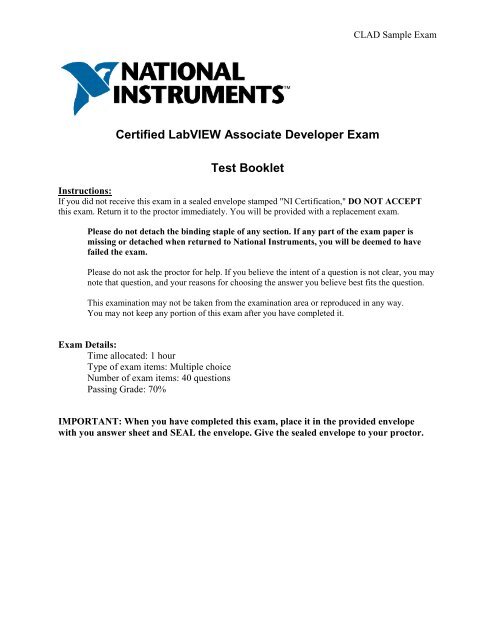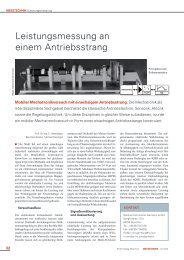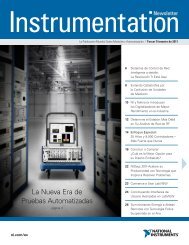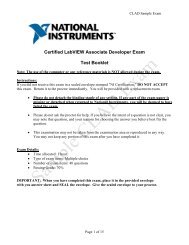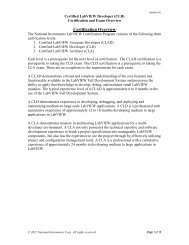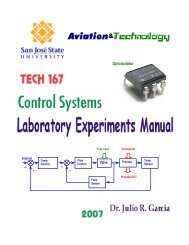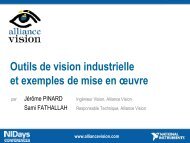Certified LabVIEW Associate Developer Exam Test Booklet
Certified LabVIEW Associate Developer Exam Test Booklet
Certified LabVIEW Associate Developer Exam Test Booklet
Create successful ePaper yourself
Turn your PDF publications into a flip-book with our unique Google optimized e-Paper software.
<strong>Certified</strong> <strong>LabVIEW</strong> <strong>Associate</strong> <strong>Developer</strong> <strong>Exam</strong><br />
<strong>Test</strong> <strong>Booklet</strong><br />
CLAD Sample <strong>Exam</strong><br />
Instructions:<br />
If you did not receive this exam in a sealed envelope stamped "NI Certification," DO NOT ACCEPT<br />
this exam. Return it to the proctor immediately. You will be provided with a replacement exam.<br />
Please do not detach the binding staple of any section. If any part of the exam paper is<br />
missing or detached when returned to National Instruments, you will be deemed to have<br />
failed the exam.<br />
Please do not ask the proctor for help. If you believe the intent of a question is not clear, you may<br />
note that question, and your reasons for choosing the answer you believe best fits the question.<br />
This examination may not be taken from the examination area or reproduced in any way.<br />
You may not keep any portion of this exam after you have completed it.<br />
<strong>Exam</strong> Details:<br />
Time allocated: 1 hour<br />
Type of exam items: Multiple choice<br />
Number of exam items: 40 questions<br />
Passing Grade: 70%<br />
IMPORTANT: When you have completed this exam, place it in the provided envelope<br />
with you answer sheet and SEAL the envelope. Give the sealed envelope to your proctor.
CLAD Sample <strong>Exam</strong><br />
Answer Sheet:<br />
To quickly check your answers against the solutions on the Solutions Page, record your answers on this<br />
Answers Sheet. Detach this page and record your answers as you go along This page is not included in the<br />
actual CLAD exam; it is included here for practice purposes only. The Solutions Page is at the end of the<br />
Sample <strong>Exam</strong>.<br />
1. _____<br />
2. _____<br />
3. _____<br />
4. _____<br />
5. _____<br />
6. _____<br />
7. _____<br />
8. _____<br />
9. _____<br />
10. _____<br />
11. _____<br />
12. _____<br />
13. _____<br />
14. _____<br />
15. _____<br />
16. _____<br />
17. _____<br />
18. _____<br />
19. _____<br />
20. _____<br />
21. _____<br />
22. _____<br />
23. _____<br />
24. _____<br />
25. _____<br />
26. _____<br />
27. _____<br />
28. _____<br />
29. _____<br />
30. _____<br />
31. _____<br />
32. _____<br />
33. _____<br />
34. _____<br />
35. _____<br />
36. _____<br />
37. _____<br />
38. _____<br />
39. _____<br />
40. _____
Sample <strong>Exam</strong> Items:<br />
CLAD Sample <strong>Exam</strong><br />
1. In what instance would you use the Probe tool rather than Highlight Execution?<br />
a. To see the flow of data<br />
b. To see the value of a wire in real time<br />
c. To look into a SubVI, as the process is running<br />
d. To slowdown the VI to show values in wires<br />
2. Which of the following statements regarding Array constants are NOT true:<br />
a. When you create an Array constant on the block diagram, it is not visible on the<br />
Front Panel.<br />
b. You cannot resize an Array constant to include more than one element.<br />
c. You can copy or drag an existing Array on the Front Panel to the Block Diagram<br />
to create a constant of the same data type.<br />
d. All array operations can be performed on an Array constant<br />
3. In the figure below, what will Result equal when this calculation is executed?<br />
a. 55<br />
b. 70<br />
c. 65<br />
d. Indeterminate<br />
4. The function of a Cluster is to:<br />
a. Allow grouping of mixed data types into logical structures.<br />
b. Present data on the Front Panel using charts or graphs.<br />
c. Provide a means of differentiating between data types on the Block Diagram.<br />
d. Separate data objects by data type on the Front Panel.<br />
5. Can Probes be attached to objects on the Front Panel:<br />
a. Yes.<br />
b. No.
6. What is the result in Array after the following code has executed?<br />
a. A 1-D array of {1, 4, 3, 2, 1, 0}<br />
b. A1-D array of {1, 8, 0, 1, 2, 3, 4, 6, 2}<br />
c. A 1-D array of {1, 4, 3, 2, 1, 0, 8, 6, 2}<br />
d. A 1-D array of {1, 8, 0, 1, 2, 2, 9}<br />
7. What is the result in new string after the following code has executed?<br />
a. Hello to you!<br />
b. Hello Wto you!<br />
c. Hello to you!!<br />
d. Helloto you!<br />
CLAD Sample <strong>Exam</strong><br />
8. Which of the following display options are available for strings on the Front Panel?<br />
a. ‘\’ Codes<br />
b. Password<br />
c. Hex<br />
d. All of the above
9. What is the result in subarray after the following code has executed?<br />
a. A 1-D Array of {8, 5, 7}<br />
b. A 1-D Array of {10, 8, 5}<br />
c. A 1-D Array of {10, 8, 5, 7}<br />
d. A 1-D Array of {7, 10, 8, 5}<br />
10. In the figure below, the output of Array Size is<br />
a. a 1-D Array of {2, 3}<br />
b. a 1-D Array of {3, 2}<br />
c. 2<br />
d. None of the above<br />
11. What is the result of the following Array subtraction?<br />
a. A 1-D Array of {-25, 25, 50}<br />
b. A 1-D Array of {-25, 25}<br />
c. A 2-D Array of {{-25, -50, -50} , {50, 25, 25}}<br />
d. A 1-D Array of {75, -50, 25}<br />
CLAD Sample <strong>Exam</strong>
CLAD Sample <strong>Exam</strong><br />
12. Which of the following allows you to plot any set of points, evenly distributed or not?<br />
a. Waveform Graph<br />
b. Waveform Chart<br />
c. XY Graph<br />
d. Both A. and C.<br />
13. Which of the following produces this XY Graph?<br />
a. A<br />
b. B
c. C<br />
d. D<br />
CLAD Sample <strong>Exam</strong><br />
14. Which of the graphs below matches the output in the Waveform Graph indicator after<br />
the following code has executed?
a. A<br />
b. B<br />
c. C<br />
CLAD Sample <strong>Exam</strong>
d. D<br />
15. The Wait function can be added to While Loops:<br />
a. To free up available memory.<br />
b. To allocate memory used by the CPU.<br />
c. To allow the processor time to complete other tasks.<br />
d. To reserve which processor the code is running on.<br />
CLAD Sample <strong>Exam</strong><br />
16. Which of the following methods is NOT a method to create a 1-D Array:<br />
a. Place an Array Shell on the Front Panel and drag a Control into the shell.<br />
b. Use a While Loop with auto-indexing disabled.<br />
c. Use a For Loop with auto-indexing enabled.<br />
d. Use the Initialize Array function.<br />
17. Which of the following statements is true regarding the execution of the following<br />
code?
CLAD Sample <strong>Exam</strong><br />
a. The loop will iterate 51 times.<br />
b. The loop will iterate 50 times.<br />
c. The loop will iterate 49 times.<br />
d. A For Loop that has a 50 wired to the count terminal will perform the same<br />
operation.<br />
18. Which of the following accurately describes the output that results from execution of<br />
the following loop?<br />
a. The last three values from the DAQ Assistant will be displayed.<br />
b. A running average of all measurements will be displayed.<br />
c. An average of the last four measurements will be displayed.<br />
d. None of the above<br />
19. Which of the following statements is NOT valid:<br />
a. You can make a Cluster of Clusters.<br />
b. You can make an Array of Arrays.<br />
c. You can make a Cluster of Arrays.<br />
d. You can make an Array of Clusters.<br />
20. Which of the following statements is true?<br />
a. The default setting for a tunnel into or out of a For Loop has auto-indexing<br />
enabled if the data being passed is an array.<br />
b. The default setting for a tunnel into or out of a While Loop has auto-indexing<br />
disabled if the data being passed is an array.<br />
c. Both A. and B. are true<br />
d. None of the above
21. Which of the following statements is true regarding the use of Coercion Dots?<br />
a. Coercion Dots improve program performance.<br />
b. Coercion Dots represent a conversion from one data type to another.<br />
c. Coercion Dots increases memory usage<br />
d. Both A. and B.<br />
e. Both B. and C.<br />
CLAD Sample <strong>Exam</strong><br />
22. Which of the following graphs matches the result in Comparison Values after the<br />
following code has executed?<br />
a. A
. B<br />
c. C<br />
d. D<br />
CLAD Sample <strong>Exam</strong>
CLAD Sample <strong>Exam</strong><br />
23. Which combination of words correctly completes the following statement?<br />
Unlike __________, which display only the most recent array of values written to them,<br />
___________ update periodically and maintain a history of the past data.<br />
a. graphs; charts<br />
b. charts; plots<br />
c. plots; graphs<br />
d. charts; graphs<br />
24. Which of the following will allow you to have multiple plots on a Waveform Graph?<br />
a. Bundle two 1D arrays of X and Y data together for each plot. Then build an array<br />
of these clusters and wire it to the Waveform Graph indicator.<br />
b. Build an n-dimensional array of data with each plot in a separate row (or<br />
column) in the array, then wire the array to the Waveform Graph indicator.<br />
c. Bundle the elements of each waveform into a cluster and build an array of these<br />
clusters, then wire the array to the Waveform Graph indicator.<br />
d. Both B. and C.<br />
25. Which of the following is NOT a traditional debugging feature used to help find errors in<br />
a VI:<br />
a. Highlight Execution.<br />
b. Single Stepping<br />
c. Breakpoints<br />
d. Stop Values<br />
26. What VI is typically used to terminate an Error Cluster wire and to display any error<br />
message?<br />
a. Merge Errors<br />
b. One Button Dialog/Two Button Dialog<br />
c. Generate Front Panel Activity<br />
d. Simple Error Handler
27. The following figure is an example of which common type of VI architecture?<br />
a. Multiple Case Structure VI<br />
b. General VI<br />
c. State Machine VI<br />
d. Parallel Loop VI<br />
CLAD Sample <strong>Exam</strong><br />
28. Clicking on the _________ button allows you to bypass a node in the Block Diagram<br />
without single-stepping through the node.<br />
a. Step Into<br />
b. Step Over<br />
c. Step Out<br />
d. Step Through<br />
29. Variants are used for all of the following but:<br />
a. Passing values between programs written with different compilers<br />
b. Allowing software to achieve a greater degree of generality<br />
c. Representing any data type<br />
d. Converting from fixed point to floating point data<br />
30. You can use all of the following data types as inputs to the case selector terminal except:<br />
a. Doubles<br />
b. Enumerated type values<br />
c. Strings<br />
d. Integers
31. The Error list shows all of the following but:<br />
a. Items with errors<br />
b. Errors and warnings<br />
c. Details about the warnings<br />
d. Error Codes<br />
32. The following breakpoint does which of the following:<br />
a. Causes the VI to abort<br />
b. Causes the VI to pause<br />
c. Causes the VI to single step over the addition<br />
d. Causes the VI to single step over the indicator<br />
33. Which of the following is NOT a component of an Error Cluster?<br />
a. Status.<br />
b. Code.<br />
c. Source.<br />
d. VI name<br />
34. What is the value in XOR Result after the following code has executed?<br />
a. 0<br />
b. 1<br />
c. True<br />
d. False<br />
35. Which of the following statements regarding the index of Arrays are NOT true:<br />
a. The index is used to access a particular element of an Array.<br />
b. The index ranges from 1 to n.<br />
c. A 2-D Array has both a column index and a row index.<br />
d. The index ranges from 0 to n-1.<br />
CLAD Sample <strong>Exam</strong>
36. Clusters provide a user with which of the following benefits?<br />
a. Clusters allow a logical grouping of related data elements.<br />
b. Clusters increase the number of Connector Pane terminals of SubVI’s.<br />
c. Clusters help to reduce wire clutter on the Block Diagram.<br />
d. Both A. and C.<br />
CLAD Sample <strong>Exam</strong><br />
37. Which chart update mode plots new data from left to right, then clears the chart and<br />
plots the newer data ?<br />
a. Strip Chart<br />
b. Scope Chart<br />
c. Sweep Chart<br />
d. Step Chart<br />
38. Which of the following methods will create an XY Graph with two plots?<br />
a. Create a single cluster from two arrays of X values and two arrays of Y values in<br />
an X,Y, X,Y pattern.<br />
b. Bundle the X and Y array pairs together into two clusters and then create an<br />
array of these two clusters.<br />
c. Bundle the X and Y array pairs together into two clusters and create a cluster of<br />
these two clusters.<br />
d. Create a single array of each of the X arrays and Y arrays in an X,Y,X,Y pattern.<br />
39. Which of the following terminals controls how many times a For Loop will execute?<br />
a.<br />
b.<br />
c.<br />
d.<br />
40. What is the value in after substring upon completion of the following code?
a. world!<br />
b. rld!<br />
c. h hello world!<br />
d. <br />
CLAD Sample <strong>Exam</strong>
CLAD Sample <strong>Exam</strong><br />
Answers Page:<br />
Below are the answers and links to additional resources for the CLAD Sample <strong>Exam</strong>. To quickly check<br />
your answers, record them on the Answer Sheet, detach the Answer Sheet, and compare it, side-by side,<br />
with the answer columns on this page.<br />
This answer page is not included in the actual CLAD exam; it is included here for practice purposes only.<br />
Question Answer Resources on Topic<br />
1 B Debugging Tips and Tricks<br />
2 B Arrays and Clusters<br />
3 B Data Flow, Debugging, and SubVIs<br />
4 A Arrays and Clusters<br />
5 B Using the Probe Tool<br />
6 C Arrays and Clusters , Feedback Node<br />
7 A Replace SubString Function<br />
8 D Configuring String Controls and Indicators<br />
9 C Array Subset Function<br />
10 A Array Size Function<br />
11 B Arrays and Clusters<br />
12 C Different Methods for Manipulating XY Graph<br />
13 B XY Graph Express VI<br />
14 D Video: Timing, Shift Registers, and Case Structures<br />
15 C For Loops and While Loop Structures<br />
16 B Arrays and Clusters<br />
17 A Tutorial: For Loops and While Loops , Different Wiring Tunnels with For Loops<br />
and While Loops in <strong>LabVIEW</strong><br />
18 C Average Last Five Values<br />
19 B Exercise: Arrays and Clusters<br />
20 C Module 3: Loops , Different Wiring Tunnels with For Loops and While Loops in<br />
<strong>LabVIEW</strong><br />
21 E How Does <strong>LabVIEW</strong> Round and Coerce Values?<br />
22 A Array Max & Min Function<br />
23 A What Is the Difference Between Graphs and Charts in <strong>LabVIEW</strong>?<br />
24 D Waveform Chart Does Not Show Multiple Plots in the Display<br />
25 D Tutorial: Debugging Tips and Tricks<br />
26 D Custom Error Handling In <strong>LabVIEW</strong><br />
27 C Application Design Patterns: State Machines<br />
28 B Tutorial: Debugging Tips and Tricks<br />
29 D Variant Data in <strong>LabVIEW</strong> -- Mastering a Higher-Level Way to Work with Data<br />
30 A Tutorial: Timing, Shift Registers, and Case Structures<br />
31 D Error List Window<br />
32 B Managing Breakpoints<br />
33 D Tutorial: Arrays and Clusters
34 B Exclusive Or Function<br />
35 B Tutorial: Arrays and Clusters<br />
36 D Managing Large Datasets within <strong>LabVIEW</strong><br />
37 B Chart Update Modes in <strong>LabVIEW</strong> and Measurement Studio<br />
38 B Tutorial: Arrays and Clusters<br />
39 D Tutorial: For Loops and While Loops<br />
40 B Match Pattern Function<br />
CLAD Sample <strong>Exam</strong>


